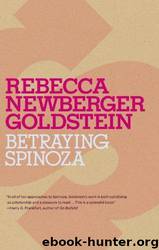Betraying Spinoza: The Renegade Jew Who Gave Us Modernity by Rebecca Goldstein

Author:Rebecca Goldstein
Language: eng
Format: mobi, epub
Tags: Modern, Jewish, Heretics, Philosophy, General, Philosophers, Jewish philosophers, Netherlands, Biography & Autobiography, History & Surveys, Biography, History
ISBN: 9780805211597
Publisher: Random House, Inc.
Published: 2009-08-11T15:28:28.129000+00:00
Rabbi Saul Levi Morteira
Rabbi Morteira, by both inculcation (his teacher in Venice was the antimystical Leon de Medina) and inclination, was of a nonmystical cast. Though he was not oblivious, of course, to the mystical leanings of many in the community, including some of his rabbinical colleagues, in his opinion the classical rabbinic sources were “the only trustworthy Kabbala.” The other two prominent rabbis in the Amsterdam community were far more touched by the spirit that had emanated out from Safed. Perhaps not coincidentally, both these rabbis were Sephardic, and had in fact been born in the lands of the Inquisition.
Manasseh ben Israel (1604–57), who has already been mentioned several times, was born in Madeira, a Portuguese colony off the coast of Africa, where he had been baptized Manuel Diaz Soeiro. His father, Gaspar Rodrigues Nuñez, had been a penitent at an auto-da-fé, and the family had fled Lisbon when they got word that he was about to be re-arrested as a Judaizer. Upon arriving in Amsterdam, Gaspar renamed himself Joseph ben Israel. He renamed his two sons Ephraim and Manasseh. Ephraim and Manasseh were the sons of the biblical Joseph, and a traditional blessing for parents and teachers to bestow on their children is “May God make you like Ephraim and Manasseh.”
Manassah ben Israel’s Judaism was strongly messianic. When he became convinced that the Lost Ten Tribes of Israel had been discovered among the natives in South America, he saw this supposed event in terms of the narrative of redemption. According to kabbalistic tradition, the Jews had to be dispersed to the four corners of the world before the Messiah could come. Now that the lost tribes had been located in the Americas, there remained only one country that was devoid of the Jewish presence: England, since the exile of Jews was still in effect there. (Apparently, he considered the New Christians who resided in the inquisitorial lands to be Jews.) It was on this messianic theory that he entered into negotiations with Oliver Cromwell to allow Jews back into England, so that the dispersal could be completed, the path paved for the Messiah. He made a trip to England in 1655, submitting his petition to Cromwell, who was impressed with the rabbi, although formal permission for a return wasn’t granted. (As a consequence of this trip, Manasseh ben Israel was not present when Spinoza was excommunicated.)
Manasseh ben Israel was the most worldly among the three rabbis, though his place in the rabbinical hierarchy of Amsterdam was not the highest. His sphere of interests brought him into contact with many Christians. He was well-published, and one work in particular, El Conciliador, which attempts to reconcile seeming contradictions within the Bible, gained him a substantial reputation among Christian scholars.
Another rabbi of the community was Isaac Aboab da Fon-seca (1605–93), and it was he who had been most directly and deeply imbued with the spirit of Lurianic kabbalah, which he transmitted to the young men who studied with him, so that a significant number of them also claimed themselves as disciples of the esoteric tradition.
Download
Betraying Spinoza: The Renegade Jew Who Gave Us Modernity by Rebecca Goldstein.epub
This site does not store any files on its server. We only index and link to content provided by other sites. Please contact the content providers to delete copyright contents if any and email us, we'll remove relevant links or contents immediately.
| Civilization & Culture | Expeditions & Discoveries |
| Jewish | Maritime History & Piracy |
| Religious | Slavery & Emancipation |
| Women in History |
Cecilia; Or, Memoirs of an Heiress — Volume 1 by Fanny Burney(31341)
Cecilia; Or, Memoirs of an Heiress — Volume 3 by Fanny Burney(30938)
Cecilia; Or, Memoirs of an Heiress — Volume 2 by Fanny Burney(30896)
The Secret History by Donna Tartt(16643)
Sapiens: A Brief History of Humankind by Yuval Noah Harari(13067)
Leonardo da Vinci by Walter Isaacson(11912)
The Radium Girls by Kate Moore(10914)
Sapiens by Yuval Noah Harari(4546)
The Wind in My Hair by Masih Alinejad(4427)
How Democracies Die by Steven Levitsky & Daniel Ziblatt(4407)
Homo Deus: A Brief History of Tomorrow by Yuval Noah Harari(4287)
Endurance: Shackleton's Incredible Voyage by Alfred Lansing(3852)
The Silk Roads by Peter Frankopan(3769)
Man's Search for Meaning by Viktor Frankl(3644)
Millionaire: The Philanderer, Gambler, and Duelist Who Invented Modern Finance by Janet Gleeson(3574)
The Rape of Nanking by Iris Chang(3522)
Hitler in Los Angeles by Steven J. Ross(3443)
The Motorcycle Diaries by Ernesto Che Guevara(3340)
Joan of Arc by Mary Gordon(3262)
